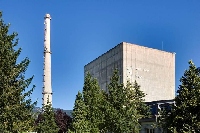Spain's Garoña nuclear power plant looks set to close in July 2013 after Nuclenor missed the deadline to submit an operating licence renewal application. The company said that the government had failed to inform it of how pending energy reforms would affect the plant's economic feasibility.
 |
| Garoña (Image: Nuclenor) |
Nuclenor said that it made several requests over the past month to the ministry to either extend the deadline for the application submission or to provide details about the planned energy reforms. It said these would have "cleared up the regulatory doubts that surround the future of the Garoña plant so as to be able to make a decision to justify the return of investment that would be required." Nuclenor is a joint venture between Iberdrola and Enresa.
Some €120 million ($153 million) of investments would be required in modernization and safety upgrades at Garoña - a 466 MWe boiling water reactor - to continue its operation.
Nuclenor said that in the past few days it had also requested information from the regional ministries of treasury, economy and employment regarding "the taxes of an autonomic nature that could directly or indirectly affect the operation of the plant and therefore the decision to request the renewal of the operating licence."
Nuclenor commented that decided not to submit an application "based on the fact that at this moment it does not know how it would be affected by the new conditions that could be established for the activity of nuclear generation within the framework of the energy reform which has yet to be approved by the government."
The plant operator said that, should the uncertainty about the economic feasibility of the continued operation of Garoña be cleared up, it would then be in a position to request a licence renewal "because technically it meets all the conditions required to operate the plant in a safe and reliable manner as has been repeatedly confirmed by the Nuclear Safety Council (Consejo de Seguridad Nuclear, CSN) and the International Atomic Energy Agency."
Trade association Foro Nuclear has previously criticised the generating cost figures used by the government in formulating its energy reforms. The €29 per MWh ($37/MWh) generating costs for nuclear, it claims, corresponds to variable costs, but does not take into account depreciation, capital gains and other facility-specific rates. This "puts the total cost of nuclear generation clearly above the average pool prices."
The regulatory framework, Foro Nuclear said, is based on "partial, outdated and invalid for the purpose of defining an energy policy based on total generation costs. By contrast, energy reform with long-term vision should consider all costs of generation for a rigorous analysis of regulatory measures."
The likelihood of Garoña closing in July 2013 comes as a disappointment after the incoming Spanish government of Mariano Rajoy moved deliberately to open the possibility of operation until 2019, rejecting the 2013 date imposed three years ago by José Luis Rodríguez Zapatero's government.
Researched and written
by World Nuclear News




_23009.jpg)
_33392.jpg)
_53504.jpg)







